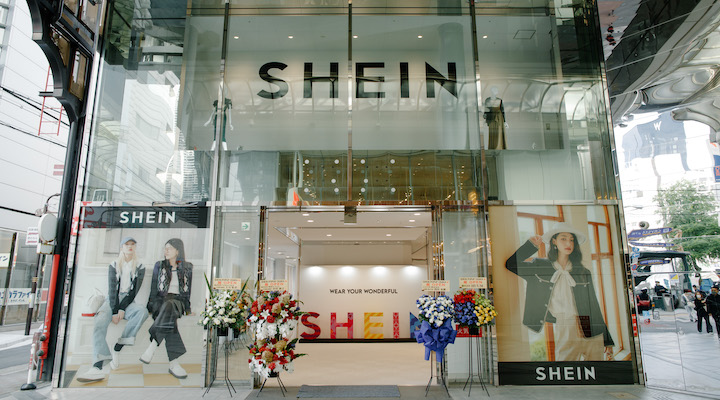A new international fashion icon has opened near the posh stores of Omotesando, Tokyo’s Rodeo Drive.
Further down Cat Street, past the flagship stores of luxury brands like Ralph Lauren, Gucci, and Louis Vuitton, you’ll find Shein, China’s answer to fast fashion.


The fashion industry has been taken by storm by its meteoric rise and the controversies that have followed. However, this two-story storefront is more than just a shrine to fashion’s fleeting nature: It is a symbol of the extraordinary wealth that Shein’s four original founders have amassed in record time.
Three decades after launching the Polo brand in 1967, Ralph Lauren is worth more than $1 billion.
In less than a decade, Shein’s CEO Xu Yangtian has amassed one of the world’s greatest fortunes. According to the Bloomberg Billionaires Index, whose estimates use an approximate one-third stake in Shein, he is worth at least $23.5 billion.
Its four co-founders (Xu, Miao Miao, Gu Xiaoqing, and Ren Xiaoqing) are worth nearly $40 billion between them, and Tiger Global, one of the company’s earliest and most visible investors, has seen a return on its money of more than 20 times.
Doubtful Beginnings
The Chinese firm’s defining feature is its speed, as it uses AI and lightning-fast supply chains to anticipate the tastes of Western teenagers and respond almost instantly to shifts in those tastes.
At its center is Xu, an outlier who defies expectations by rising to the top of the global fashion industry.
Chris Xu was born in the eastern Chinese province of Shandong in 1983. He earned a degree in international trade and worked for a short time for an internet marketing firm, where he assisted in increasing website visits and product sales. In 2008, he and two partners launched their first e-commerce business, which sold women’s apparel and accessories.
When he started Shein (pronounced “she-in”) in Nanjing a decade ago, he only had a small team of employees with him. However, among them were Miao, Gu, and Ren, who would later become his most trusted executives despite the project’s failure. They are now in charge of operations, product development, and supply-chain management.
Based on their estimated 7.6% stakes, they are each worth more than $5 billion. These have all been kept out of the spotlight and are not listed on the store’s main website.
A representative for Shein said the company does not discuss financial matters because it is privately owned and disputed the accuracy of the founders‘ fortunes but did not provide any further details.
Pandemic Boost
The company’s success can be directly traced back to the founders‘ backgrounds in online marketing. Shein uses real-time data and algorithms to track what customers are buying and produce more of the most popular items while keeping production and shipping times low.
Teens and twenty-somethings stuck at home and often on a tight budget, flocked to the company’s dirt-cheap online offerings during the pandemic. Gen Z, or those born in the late 1990s to early 2010s, make up more than half of the company’s clientele.
Suppliers need to deliver new designs in about 10 days, even faster than Zara’s famous three-week turnarounds, because the retailer stocks a wide variety of items under $10.
Shein’s “clothing haul” videos, in which influencers showcase $3-and-up “dream wardrobes,” have gone viral across Europe and the United States, the company’s two most important markets. TikTok and YouTube were flooded with these videos every time there was a major shopping holiday because Shein would drop thousands of new products every single week. The company spices up its advertising with celebrity endorsements by staging online concerts with A-list performers.
Shein was worth $2.5 billion as of the end of 2018. After a year, it had multiplied by two. It was estimated to be worth $100 billion in a funding round in April 2022, making it larger than both Hennes & Mauritz AB and the company behind Zara.
Secondary trades in July showed the company was still worth $70 billion, despite recent concerns over slowing growth and turmoil in China’s tech sector dimming its prospects.
Investors like Sequoia China and IDG Capital have reaped the benefits of their early bets on Shein’s success.
But few have reaped the rewards as much as Tiger Global, founded by Chase Coleman and Scott Shleifer. According to a document obtained by Bloomberg, the New York-based firm invested $72 million in early funding rounds in 2018 for a 2.7% stake. The return on investment is over twentyfold.
Despite the currently dismal environment for private tech companies, Tiger Global has poured even more money into Shein this year, making it one of the firm’s biggest successes. Tiger Global’s representative said they can’t say anything at this time.
Global Perspective
Shein has a big advantage over ByteDance Ltd., which runs TikTok and is also a Tiger Global investment in China. TikTok’s value has also gone up, but the company is having trouble going public, in part because of worries in Washington. Shein has told investors that it wants to go public in the United States as soon as 2024.
Shein almost never sells anything in China. It now has a 40% share of the fast-fashion market in the U.S. Last year, sales reached $16 billion, up from $10 billion in 2020.
Allison Malmsten, who is in charge of public research at Daxue Consulting, said, “Investors are more comfortable with Shein now that they know it depends on foreign consumer demand and not Chinese consumer demand.” “This means Shein can avoid the effects of China’s economy slowing down.”
Focusing on overseas customers has also kept Xu out of trouble with the government. He hasn’t given an interview since he started the company, and many Chinese tycoons have been hurt by Xi Jinping’s push for “common prosperity” and a crackdown on tech and property companies.
Xu, meanwhile, has been showing up more and more in Singapore. A local filing shows that the Chinese citizen lives at an address in the city-state and is also a permanent resident there.
Shein’s business is facing more and more risks
As the pandemic has gone away, new competitors have come up and sales have stopped going up. Its business practices have also come under more scrutiny, especially since it works in an industry that encourages waste and copyright theft. A Bloomberg investigation found that clothes shipped to the U.S. were made with cotton from China’s Xinjiang region, where U.S. officials say Xi’s government mistreats the Uyghur minority.
Guoli Chen, a professor of strategy at INSEAD in Singapore, says that Shein’s main challenge is to change its image and become a long-term player. “The next generation will care more about how socially responsible a company is.”
Shein is increasing its offline presence to connect with customers and raise brand awareness for now. It opened temporary stores in London, Sydney, and New York this year.
All sales are done through the app or website at its first permanent store, which is in Tokyo.
Jitong Li, an analyst at the market research firm Euromonitor International, said, “They’re not really selling things in the store.”
Instead, the main goal is to bring in potential customers and influential people like musicians, models, and travel bloggers and get them to post about their outfits on social media. Li said that Shein can then use its artificial intelligence technology to study and track how customers act, which will help it get more online customers in the end.




